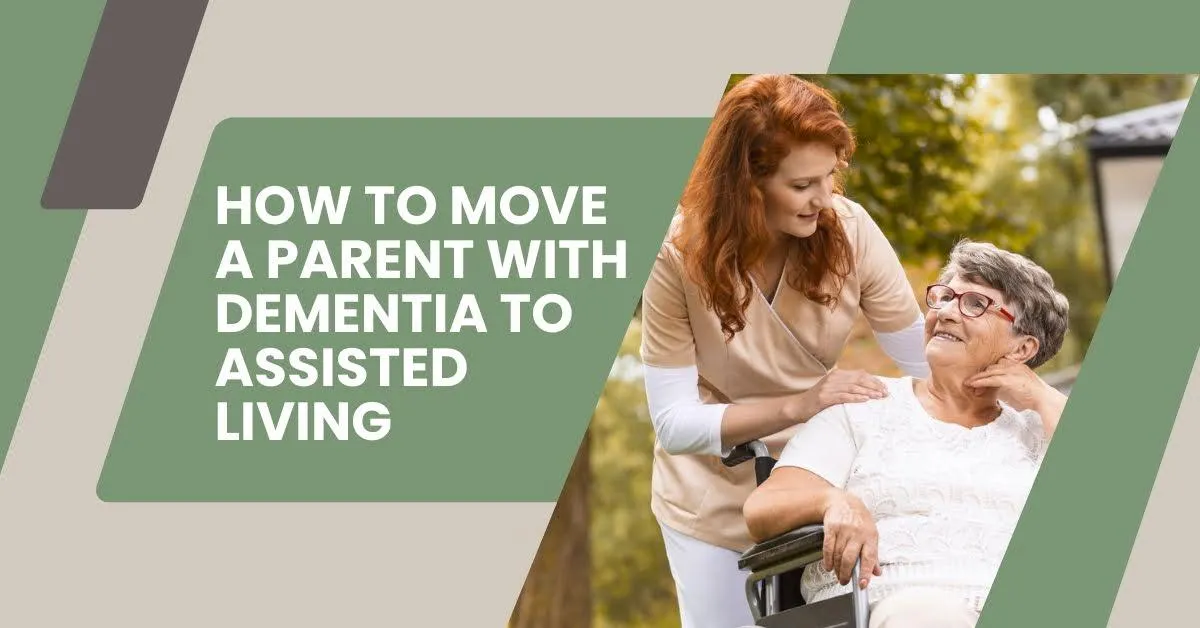
How to Move a Parent with Dementia to Assisted Living
When doctors diagnose your parents with dementia, it can be a difficult and emotional time for both them and your family. As the disease progresses, everyday tasks that used to be second nature may become overwhelming and unsafe. As a result, many families decide to move their parents with dementia to assisted living. While the decision is never easy, it often provides the care, support, and environment that help your parents live a better and safer life.
Making the transition from home to assisted living can be overwhelming, both for you as a caregiver and for your loved one. But, with careful planning, understanding, and patience, the process can go more smoothly. In this blog, we will explore practical steps on how to move a parent with dementia to assisted living, as well as provide guidance on how to help them adjust to their new home.

1. Understanding the Need for Assisted Living
Dementia is a general term for a decline in cognitive ability, affecting memory, thinking, and behavior. It can lead to difficulty with everyday activities like cooking, driving, or even bathing. As dementia progresses, the safety of your loved one may become a concern. Wandering, getting lost, or forgetting to take medications are common problems.
This is when assisted living becomes an important consideration. Unlike a nursing home, which provides full medical care, assisted living communities provide a balanced environment where individuals can get help with activities of daily living (ADLs) like bathing, dressing, or managing medications, but still maintain some independence. These facilities offer a safe environment where your parents can receive personalized care suited to their needs.
2. Evaluating the Right Time to Move Your Parent
Before making any decisions, you need to assess when the right time is for your parents to transition to assisted living. Some signs that it may be time to consider moving a parent with dementia to assisted living include:
Difficulty managing daily tasks, such as preparing meals, managing finances, or handling hygiene.
Safety concerns, such as frequent falls, wandering, or leaving the house without knowing where they are going, exist.
Changes in behavior, such as aggression, confusion, or withdrawal.
A lack of support at home, especially if you or other family members are unable to provide the level of care your parents require.
If you’re noticing any of these signs, it’s worth considering options like Walnut Villa, which is a facility specifically designed to meet the needs of individuals with dementia and offer the right level of care.
3. Researching Assisted Living Communities
Once you’ve determined that assisted living is the best option for your parents, the next step is to research potential communities. Assisted living facilities vary greatly in terms of care, amenities, and cost. Since not everyone can handle dementia care, you must find a place that specializes in memory care.
Look for a facility that offers services customized to dementia care, like memory support programs, 24/7 staff assistance, and secure living spaces. Also, consider the size and layout of the facility. Some seniors with dementia may feel overwhelmed in larger, more crowded facilities, while others may thrive in a more social environment.
Walnut Villa, for example, offers a homelike atmosphere and a variety of specialized programs for dementia patients. This kind of facility can provide a structured environment, helping your parents feel safe and comfortable while adjusting to life with dementia.
4. How to Discuss the Move with Your Parent
Talking to a parent with dementia about moving to assisted living can be difficult. Dementia can affect memory and the ability to process complex ideas, making it harder for your parents to understand the situation. Here’s how to approach the conversation:
Be honest but gentle: Explain that you want them to live in a place where they will get the best care possible.
Keep it simple: Use clear and direct language. Avoid overwhelming them with too much information at once.
Focus on the positives: Talk about the benefits of assisted living, such as making new friends, having access to activities, and getting the care they need.
Reassure them: Remind your parents that they will continue to participate in family life. Visits, phone calls, and outings are still important.
If your parents have difficulty understanding the need for assisted living, you may have to have the conversation multiple times or even reframe it to meet their level of understanding. Sometimes involving a healthcare provider or the staff from the assisted living community helps explain the care and safety that they will provide.
5. Preparing for the Move
After you have had the conversation, it’s time to start planning the move. Moving a parent with dementia to assisted living requires careful thought and preparation. Here's how you can prepare both physically and emotionally:
Step 1: Prepare the Home for Sale or Transition
If your parents are moving out of their home, there are many logistical steps involved. You may need to downsize or prepare the house for sale. This can be an emotional process, especially if the home holds sentimental value. Take your time and involve your parents in the process if they are able.
Step 2: Pack Personal Items
Make your parent’s new space feel as familiar as possible by bringing personal items from home. This could include family photos, their favorite blanket, or sentimental objects that will help them feel at ease in their new environment.
Step 3: Review Medical Information
Ensure that the assisted living facility receives all medical records, prescriptions, and health information. It’s also a good idea to schedule a meeting with the staff to discuss your parent’s health history, current medications, and care requirements. This ensures that the staff can prepare to meet your parent’s specific needs.
Step 4: Financial Planning
The cost of assisted living can vary widely depending on the facility, location, and level of care required. Make sure you have a clear understanding of the costs and explore financial options, including long-term care insurance, Medicaid, or other funding sources.
6. Managing Emotions During the Transition

The emotional impact of moving a parent with dementia to assisted living can be overwhelming for both you and your parent. You may feel guilt, sadness, or frustration, while your parent may feel confused, anxious, or fearful. Here are some tips to manage the emotional aspects:
Stay positive
Although it’s difficult, remind yourself that you are making the decision that’s best for your parent’s safety and well-being.
Communicate regularly
Maintain open lines of communication with the staff to ensure your parents are adjusting well.
Be patient
The transition to assisted living may take time. Your parents may not immediately feel comfortable or understand why they are there. Be patient and supportive as they adjust.
Take care of yourself
Don’t forget to care for your own well-being. Caregiver burnout is real, so make sure you’re taking breaks and seeking support from family members, friends, or support groups.
7. Visiting Your Parent in Assisted Living
Once your parent settle into their new home, you should make regular visits. Visiting your parents in assisted living will provide emotional comfort and reassurance. However, there are some things to keep in mind when visiting:
Be consistent with your visits, but avoid overdoing it. Too many visits can make your parents more anxious or confused.
During visits, engage in simple activities, like reading to your parent, holding their hand, or talking about happy memories. Avoid overloading them with too much information.
Be mindful of the staff’s schedule and routines. Too many visitors at once should not disrupt structured activities and meal times in assisted living facilities.
8. Understanding Assisted Living Signs
As your parent adjusts to their new living environment, there may be certain assisted living signs that indicate they need additional support. These can include:
Increased confusion or difficulty recognizing people
Withdrawal from social activities or lack of interest in favorite hobbies
Signs of depression or anxiety
Difficulty eating or taking medications as prescribed
If you notice any of these changes, it’s important to speak with the facility’s staff to adjust your parent’s care plan. Assisted living communities equip themselves to respond to these issues and offer interventions that help your parents feel more comfortable and engaged.
9. Ongoing Care and Support
Even after the move, it’s essential to stay actively involved in your parent’s care. This means:
Regular communication with the staff to monitor your parent’s health and well-being
Attending family meetings to discuss any changes in care or concerns
Continuing to visit and offer emotional support, especially during times of transition
Being involved in your parent’s care gives you peace of mind and helps your parents feel supported throughout their journey.
Conclusion:
In conclusion, moving a parent with dementia to assisted living is a big decision, but it’s often the right choice for their safety, well-being, and quality of life. By researching the best facilities like The Walnut Villa, preparing carefully, and staying involved in their care, you can ensure that your parent’s transition is as smooth and comfortable as possible.
FAQs
1. How do I know when it’s time to move my parents with dementia to assisted living?
Signs that your parents may need assisted living include difficulty with daily tasks, safety concerns, and behavior changes. If their care needs exceed what you can provide at home, it may be time to consider assisted living.
2. What should I look for in an assisted living facility?
Look for a facility that specializes in dementia care, offers a safe and secure environment, and provides personalized care plans. For example, designers specifically created Walnut Villa to meet the needs of individuals with dementia.
3. How can I help my parents adjust to assisted living?
Reassure your parents, bring familiar items, and make their new space feel like home. Be patient as they adjust and stay involved in their care.
4. How often should I visit my parents in assisted living?
Visits should be consistent but not overwhelming. Find a balance that works for both you and your parent, ensuring they feel loved and supported.
5. How can I manage my emotions during this transition?
It's natural to feel guilty or sad. Remember, you’re making the decision that’s best for your parent’s safety and well-being. Seek support from family, friends, or support groups.

Facebook
Instagram